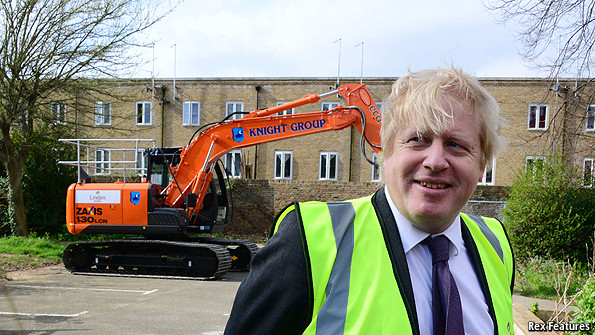House prices and pension pots
03-25-2014
Blighty
Britain
Build on the green belt or introduce space rationing: your choice

ONE of the charms of Boris Johnson, the Mayor of London, is that he still acts much as he did as a polemical journalist. See his column in this morning’s Telegraph defending the government’s new pension reforms. Here is what he says is the great advantage of allowing pensioners to spend their pension pots as they like, instead of buying annuities:
“Of course some people will want to continue to milk the desiccated beast, and rely on the security of the annuity; and others will want to slaughter it, and use the cash as they see fit. I don’t think many will end up blowing it on Italian cars, actually. I think the vast majority will want to put their pots into the market with the greatest yield over the past 40 years – and that is property.”
No member of the cabinet will say this, but Boris is quite right: one consequence of this reform is likely to be yet more money flooding into Britain's overheated housing market. There will be two flows. First, as Boris approvingly suggests, retiring baby boomers will lend their children money to put together a deposit for a house. Second, as he skips over, they will use the money as a deposit of their own to buy flats or houses to be rented out.
(This can be overstated. Already pensioners can take out 25% of their pension pot tax free. Under the new rules, any extra money withdrawn will be taxed at the marginal income tax rate, so few people will be taking out the entire pot in one go. But not all that much has to be spent on houses to make a difference.)
The trouble is, the consequences will not be as benign as the Mayor seems to think. Because housing isn’t quite like other goods. Look at it like this: if lots more people put down deposits on new cars, car manufacturers will simply expand supply. Since car-making is highly competitive, and the supply of raw materials fairly easily increased, all that extra demand will not have much effect on the price. With housing, by contrast, the supply is almost wholly unresponsive to price. If you increase the number of people who can afford to buy homes at current prices, then the main effect will be to raise prices high again to make housing about as unaffordable as it was before.
We’ve already seen this happen before. Since the early 1980s, the amount of money that people can afford to spend on property has increased enormously, for two reasons. First, interest rates have fallen continuously: in the early 1990s, mortgages came at an annual cost of 12% or more; now they come at rates of less than 3%. Second, banks caught up with changing society, and started issuing mortgages according to the joint incomes of couples, rather than just the higher earner’s income. That means that a dual-earner professional household can borrow a lot more than they used to be able to.
What happened to this torrent of money? It certainly didn’t create a spectacular increase in the amount of building. Britain is building fewer houses today than at any point since the 1920s. Instead, the main effect was to ramp up prices. If, since 1971, the price of groceries had increased at the same rate, a chicken would now cost £51. By adding in yet more money from pension pots, you worsen an already dire situation. Already, in London, only those people able to borrow or inherit a load of money can easily afford deposits of £30,000 or more. Young people without parents to lean on are stuck renting. Soon, the rest of the country may look like that.
There is one other possibility of course. The supply of land in Britain is artificially restricted by an absurdly tight planning system. Free up more land for building and the flood of money into property will not all go into the pockets of home-owners and buy-to-let landlords. Instead, it might actually produce some new housing. In areas where building is difficult, prices would still rise, but the overall effect would be less damaging, because people squeezed out would at least have somewhere to go. London's green belt would give way to pleasant new suburbs. Planned correctly, the increases in land value that would result from giving planning permission could be used to pay for the infrastructure to get people to work. (Incidentally, it is a disgrace that more is not being built in areas where house prices have been boosted by government investment in infrastructure, such as along the route of Crossrail.)
The alternative to building more is far less liberal. If we refuse to add more housing space to the nation's stock, we will have to start distributing what we’ve got more evenly. For people on the left, inequality is at the core of the housing crisis. In his new book, “All that is Solid. The Great Housing Disaster”, Danny Dorling, a radical left wing academic, argues that rich people buy up expensive space, leaving the poor squashed into what’s left. If the housing stock is not allowed to grow with demand, then competition for housing is a zero-sum game, one in which the success of the rich necessarily makes the poor poorer. The logical alternative to building more is space rationing, or else the massive redistribution of wealth. One for NIMBYs to consider.

